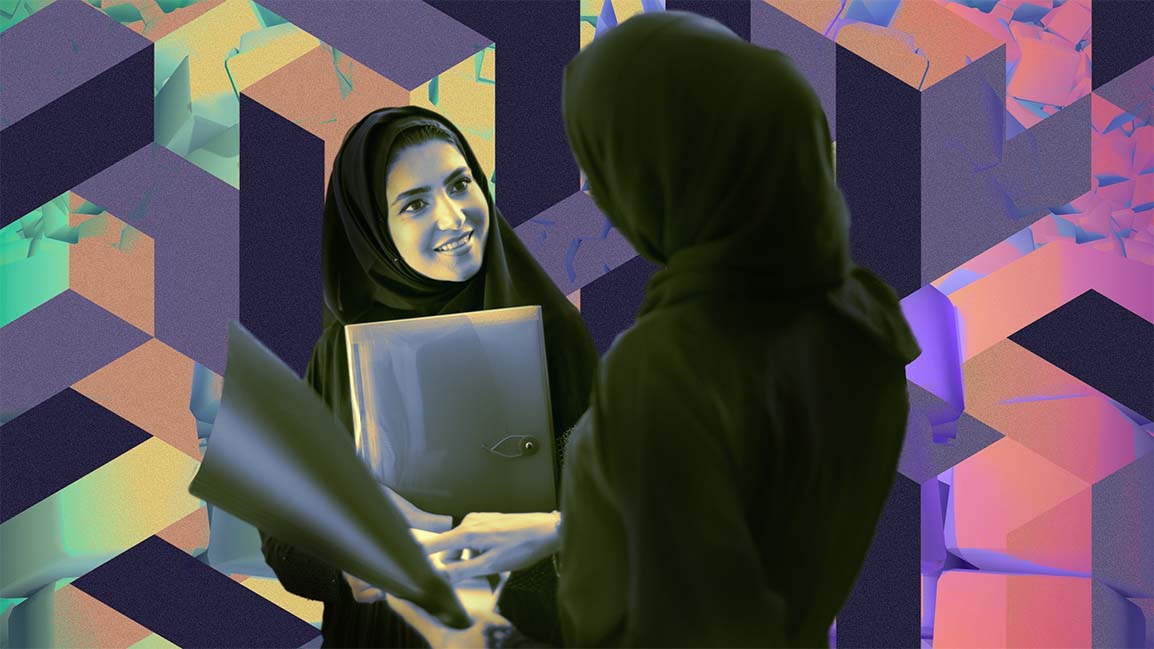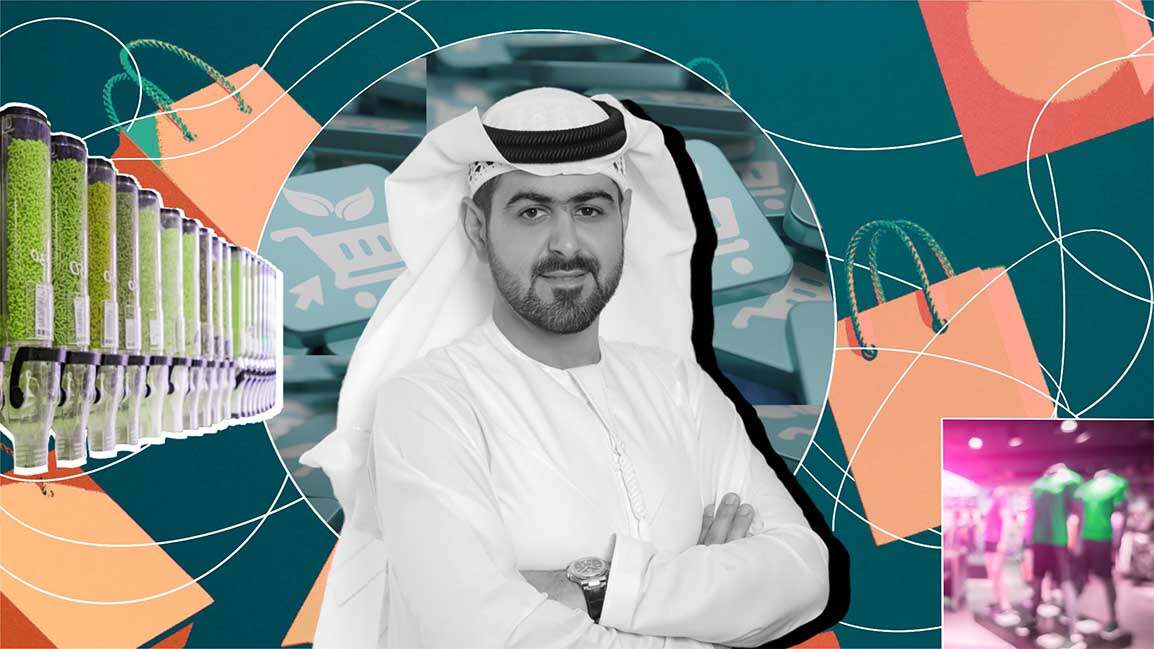- | 9:00 am
Women entrepreneurs in the Middle East face challenges. Digitization can help
From minting NFT art to using social media marketplaces, women in the region are using tech to grow their businesses.

As a beauty influencer, Huda Kattan stands out among millions of young Arab women as someone who inspires them to join the rising tide of female entrepreneurs from the region. The way she monetized her social media presence has set the tone for female-led digital businesses across the Middle East.
It was the image of businesswomen such as Muna Al Gurg as a businesswoman, philanthropist, and investor in women-run ventures through Mindshift Capital, that gave confidence to budding female entrepreneurs. Having tackled cultural restrictions in the Middle East, the pandemic was just another phase where they successfully maintained a work-life balance.
Artists like Kristel Bechara have demonstrated entrepreneurial acumen by embracing mediums such as blockchain technology. The first artist from the Middle East to turn her work into NFTs, Bechara says, “NFTs have helped bring massive global visibility to Middle Eastern artists, who are putting themselves out there by minting their own NFT art. Because of this visibility, luxury brands actively seek to collaborate with artists.”
The rise of women in tech was inevitable, considering women comprise more than half of all STEM grads in the Middle East. Naturally, more than a quarter of digital startups in the region have been founded by women. Further, Arab women are making waves globally by building digital ventures. In the US, 4% of total patents come from Arab Americans, and women from the diaspora contribute considerably.
From women finding employment via ride-hailing services such as Uber to streaming services including Spotify promoting female artists through initiatives such as SAWTIK, tech is driving drastic change in the Arab world.
STEERING THE CAPITAL TO DRIVE EFFECTIVE CHANGE
Any great idea requires the right financial backing and investors’ faith to succeed. Arab women entering the startup space still struggle to get enough funding. But the disparity in funding is slowly being addressed as more women are stepping in as venture capitalists. Ambar Amleh, the founder of the Ibtikar investment fund, concentrates on funding early-stage startups in Palestine. This is significant since, according to a World Bank report, 23% of Palestinians who founded tech companies in the West Bank and Gaza Strip are women.
“Palestinians make great entrepreneurs because they are used to dealing with challenges and hacking solutions. They are well-positioned to create products that can serve the entire Middle East,” says Amleh.
In Dubai, VC firm Mindshift launched a bid to raise $10 million, focusing on funding women-led startups. The initiative was backed by entrepreneurs such as Muna Al Gurg & Haleema Alowais, among others. Mindshift has already supported 11 ventures founded by women across the Middle East and Southeast Asia.
TURNING SOCIAL MEDIA INTO A MARKETPLACE
Social media and ecommerce have allowed women in the Middle East to explore more products from home. It has enabled them to reach a wider consumer base digitally. Facebook groups such as Female Fusion Network, The New Arab and the Middle East and North African Businesswomen’s network have enabled female entrepreneurs to connect with other entrepreneurs and VCs to turn their ideas into digital startups.
On the other hand, thriving in a connected ecosystem, Saudi Arabia’s female rapper Jara received exposure in the Middle East through Spotify’s initiative.
The ability to market art as digital tokens enabled Lebanon’s Bechara to become the Middle East’s first artist to launch NFTs. “For the first time, digital art is finding its rightful spot in the limelight all because of NFTs, and artists of all mediums are benefiting from the technology’s numerous advantages. For example, NFT allows artists to receive royalties every time their artwork is traded or sold, which is incredible. This allows them to keep reaping the financial benefits of their work perpetually,” she says.
ACCEPTING DIGITIZATION WITH CONFIDENCE
From groceries to online fashion, households in the Middle East are increasingly relying on digital payments. Like women consumers, female entrepreneurs have also shown more acceptance of e-transactions. A Mastercard survey found that an overwhelming majority of the Middle East’s businesswomen have a digital presence. It had earlier found that women in the region were more confident and adaptable to online services.
Amleh says a positive impact of the pandemic is digitization that many women in the Arab world, who prefer not to work outside the home, or far from home, or alongside men, either by their own choice or their families, can now own and run their micro and small businesses from home.
Female entrepreneurs also support other women with learning and fintech platforms to support their businesses. Eman Bushnaq’s Meem helps with financial literacy, while Tanda by Zeina Kharouf makes alternative banking services accessible for female entrepreneurs.
THE REALITY BEYOND HEADLINES
Although the developments in Dubai, Abu Dhabi, or Riyadh may paint a positive picture of the participation of women in the Middle East’s workforce, it is still far from the region’s reality.
“COVID and the related lockdowns, economic hits, and shifting needs at home hit women the hardest. Women were first to be let go off by employers,” says Amleh.
SUPPORTING WOMEN IN EVERY SPHERE OF SOCIETY
Tech transformation can only be fully successful when it reaches the most underprivileged sections of society. The UN Women Oasis Centres in Jordan allow refugees to earn while staying within the camps. During the lockdown, the UN launched blockchain accounts, where these working women can save their salaries. An iris-scan system secures access for women to their accounts.
Technology allows women to make the best of their talent and creativity. “With NFTs, the ownership of my work is unquestionable, as there is an immutable and transparent record on the blockchain that will always authenticate the originality of my artwork. Nobody can challenge that, and it is on the internet for everybody to see,” says Bechara.
The accelerated tech transition of the Middle East has brought drastic changes in how business is conducted. Successful female entrepreneurs providing tech tools and funds for other women can create a separate startup ecosystem for women.
Reiterating the importance of women actively investing in new ventures, Amleh says, “Having more women around the decision-making table in venture capital means an increase in investments going to women. Why? Because women feel more comfortable approaching that VC, and because women understand the opportunity of investing in women.”


































